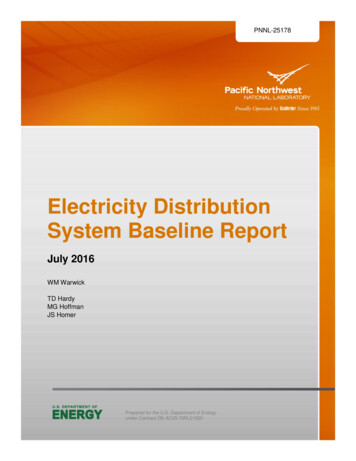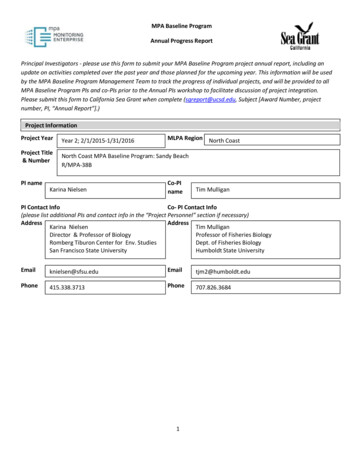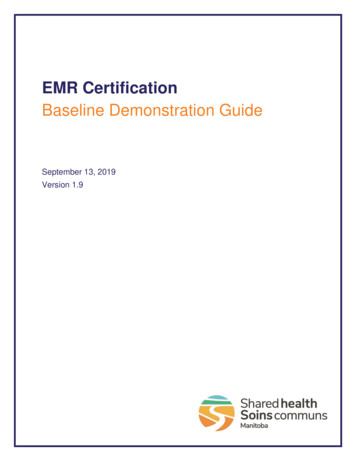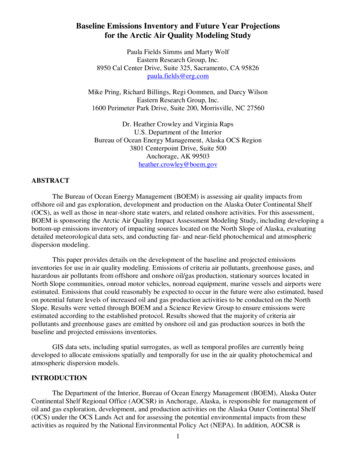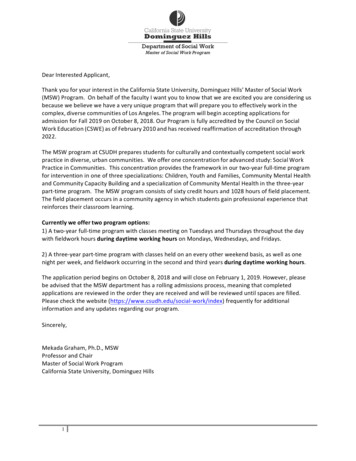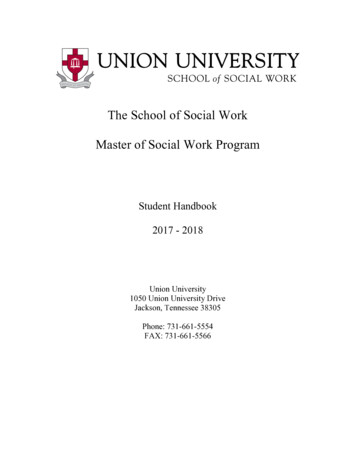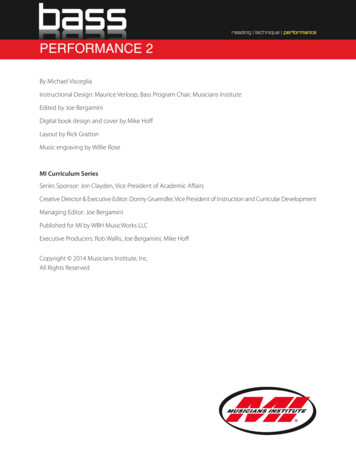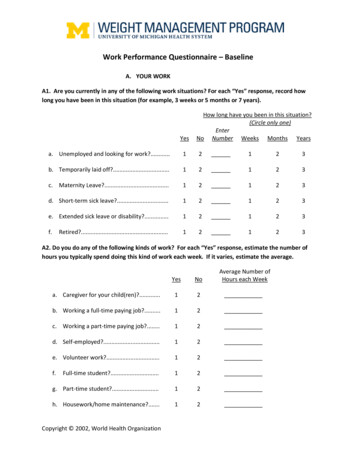
Transcription
Work Performance Questionnaire – BaselineA. YOUR WORKA1. Are you currently in any of the following work situations? For each “Yes” response, record howlong you have been in this situation (for example, 3 weeks or 5 months or 7 years).YesHow long have you been in this situation?(Circle only one)EnterNo Number Weeks Months Yearsa. Unemployed and looking for work?.12123b. Temporarily laid off?.12123c. Maternity Leave?.12123d. Short-term sick leave?.12123e. Extended sick leave or disability?.12123f.12123Retired?.A2. Do you do any of the following kinds of work? For each “Yes” response, estimate the number ofhours you typically spend doing this kind of work each week. If it varies, estimate the average.YesNoAverage Number ofHours each Weeka. Caregiver for your child(ren)?.12b. Working a full-time paying job?.12c. Working a part-time paying job?.12d. Self-employed?.12e. Volunteer work?.12f.Full-time student?.12g. Part-time student?.12h. Housework/home maintenance?.12Copyright 2002, World Health Organization
A3. If you currently work for pay or profit or are on sick leave, please choose the category that bestdescribes your main job. If none of the categories fits you exactly, please respond with the closestcategory. If you are currently not working and not on sick leave, skip to question B1. (Circle only onenumber.)1. Executive, administrator, or senior manager(e.g., CEO, sales VP, plant manager)2. Professional(e.g., engineer, accountant, systems analyst)3. Technical support(e.g., lab technician, legal assistant, computer programmer)4. Sales(e.g., sales representative, stockbroker, retail sales)5. Clerical and administrative support(e.g., secretary, billing clerk, office supervisor)6. Service occupation(e.g., security officer, food service worker, janitor)7. Precision production and crafts worker(e.g., mechanic, carpenter, machinist)8. Operator or laborer(e.g., assembly line worker, truck driver, construction worker)A4. How many people do you personally supervise on your main job?NUMBER OF PEOPLECopyright 2002, World Health Organization
A5. How many hours does your employer expect you to work in a typical 7-day week? If it varies,estimate the average. If you are self-employed, estimate the number of hours you would consider afull work week. If you have more than one job, combine total number of hours for all jobs.NUMBER OF HOURSA6. Now please think of your work experience over the past 7 days. In the space provided below,write the number of days you spent in each of the following work situations.In the past 7 days, how many days did you NUMBEROF DAYSa. miss an entire work day because of problems with your physical or mental health?b. miss an entire work day for any other reason (including vacation)?c. miss part of a work day because of problems with your physical or mental health?d. miss part of a work day for any other reason (including vacation)?e. come in early, go home late, or work on your day off?A7. About how many hours altogether did you work in the past 7 days? (See examples below.) If youhave more than one job, report the combined total number of hours for all jobs. If you did not workat all in the past 7 days, enter “0” and skip to question B1.NUMBER OF HOURSExamples for Calculating Hours Worked in the Past 7 Days8 hours per day for 5 days 40 hours7 hours per day for 5 days 35 hours8 hours per day for 4 days plus 4 hours per day for 1 day 36 hours7 hours per day for 3 days plus 4 hours per day for 2 days 29 hoursCopyright 2002, World Health Organization
A8. Did you have any of the following experiences at work in the past 7 days?Yes Noa. Any special work success or achievement?.12b. Any special work failure?.12c. An accident that caused either damage, work delay, a near miss, or a safety risk?.12d. If you answered “Yes” to any of the questions A8a, A8b, or A8c, please describe what happened.A9. The next questions are about the time you spent during your hours at work in the past 7 days.Circle the one number from each question that comes closest to your experience.All ofMost ofthe time the timeSome ofthe timeA little of None ofthe time the timea. How often was your performance higherthan most workers on your job?.12345b. How often was your performance lowerthan most workers on your job?.12345c. How often did you do no work at timeswhen you were supposed to be working?.12345d. How often did you find yourself notworking as carefully as you should?.12345e. How often was the quality of your worklower than it should have been?.12345How often did you not concentrateenough on your work?.12345g. How often did health problems limit thekind or amount of work you could do?.12345f.Copyright 2002, World Health Organization
A10. On a scale from 0 to 10 where 0 is the worst job performance anyone could have at your job and10 is the performance of a top worker, how would you rate the usual performance of most workers ina job similar to yours? (Circle the 11. Using the same 0-to-10 scale, how would you rate your usual job performance over the past yearor two? (Circle the 12. Using the same 0-to-10 scale, how would you rate your overall performance on the days youworked during the past 7 days? (Circle the number)WorstPerformance01234Copyright 2002, World Health Organization5678TopPerformance910
A13. How would you compare your overall job performance on the days you worked during thepast 7 days with the performance of most other workers who have a similar type of job? (Circle thenumber)1.2.3.4.5.6.7.You were a lot better than other workersYou were somewhat better than other workersYou were a little better than other workersYou were about averageYou were a little worse than other workersYou were somewhat worse than other workersYou were a lot worse than other workersCopyright 2002, World Health Organization
B. DEMOGRAPHICSB1. What is your current marital status?a.b.c.d.e.Married or cohabitingSeparatedDivorcedWidowedNever marriedB2. How many children do you have?a.b.c.d.e.NoneOneTwoThreeFour or moreB3. What is your annual income from your job, before taxes? (Circle the letter)a.b.c.d.e.f.g.h.i.j.k.l. 1 - 999 1,000 - 1,999 2,000 - 2,999 3,000 - 3,999 4,000 - 4,999 5,000 - 5,999 6,000 - 6,999 7,000 - 7,999 8,000 - 8,999 9,000 - 9,999 10,000 - 10,999 11,000 - 11,999m.n.o.p.q.r.s.t.u.v.w.x. 12,000 - 12,999 13,000 - 13,999 14,000 - 14,999 15,000 - 15,999 16,000 - 16,999 17,000 - 17,999 18,000 - 18,999 19,000 - 19,999 20,000 - 24,999 25,000 - 29,999 30,000 - 34,999 35,000 - 39,999Copyright 2002, World Health Organizationy.z.aa.bb.cc.dd.ee.ff.gg.hh. 40,000 - 44,999 45,000 - 49,999 50,000 - 74,999 75,000 - 99,999 100,000 - 149,999 150,000 - 199,999 200,000 - 299,999 300,000 - 499,999 500,000 - 999,999 1,000,000 or more
Work Performance Questionnaire . have more than one job, report the combined total number of hours for all jobs. If you did not work at all in the past 7 days, enter 0 and skip to question B1. _ NUMBER OF HOURS Examples for Calculating Hours Worked in the Past 7 Days 8 hours per day for 5 days 40 hours 7 hours per day for 5 days 35 hours 8 hours per day for 4 days plus 4 hours per .File Size: 420KBPage Count: 7
